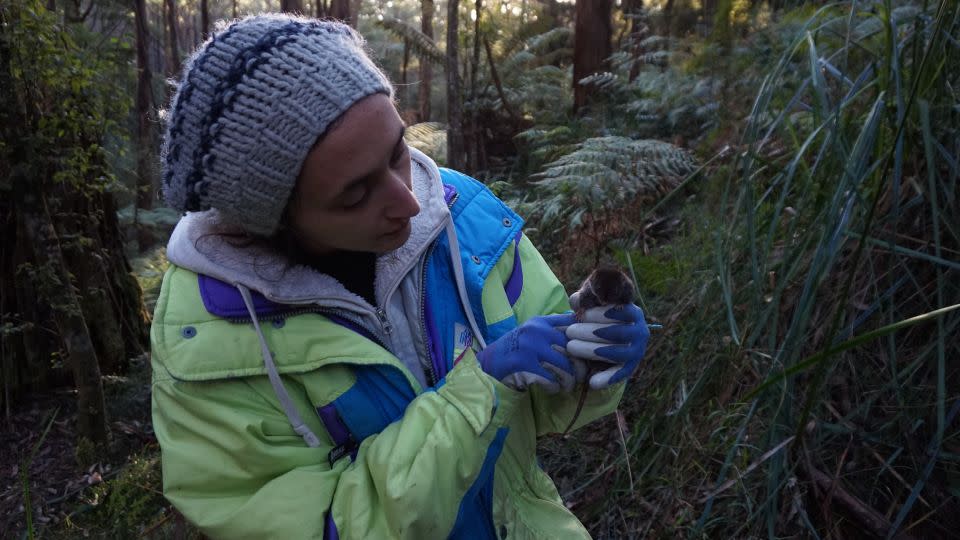For some, happiness is being able to get enough sleep. But for a small marsupial in Australia, sex takes priority over getting some sleep, and he’s willing to sacrifice hours of it every day to get his happy ending.
Australia-based scientists found that mouse-sized male antechinus alter sleep to leave more time for reproductive activities during mating season, with a monitored male halving his sleep time during this period.
The study, published Thursday in the journal Current Biology, is the first to show direct evidence of such “extreme” sleep restriction in any land-dwelling mammal, according to the researchers.
“Animals need to reproduce to pass on their genes, but they also need to sleep to survive,” lead author and animal behavior researcher Erika Zaid of La Trobe University in Melbourne told CNN.
“Long-lived animals like humans and elephants don’t have this pressure to reproduce in a short period of time. “They have the luxury of being able to sleep as much as they want (and) need every day,” he said.

Zaid explained that male antechinus, unlike their female counterparts, are semelparous, meaning they can only reproduce once in their lifetime, making long sleep a luxury that could cost them the opportunity to pass on their genes. According to researchers, non-breeding dusky antechinuses spend an average of 15.3 hours a day asleep.
“Sleep restriction in male antechinus reproduction is likely to be an adaptive behavioral response driven by strong sexual selection,” the article said. This drives them to compete with other males to breed with as many females as possible, before dying shortly after the first and last mating season.
To study the semelparous marsupials, researchers examined two species of antechinus: the dusky antechinus (Antechinus swainsonii) and the wild, agile antechinus (Antechinus agilis), both in captivity and wild.
The researchers found that males of both species were not only more active during mating season, but also slept less during the same period.
The data showed that men slept three hours less each night, every night, for three weeks; This approximately corresponds to the length of the mating period. Zaid said that males, which live only 11 months, can reproduce once in their lifetime before dying, while females can reproduce more than once.
La Trobe University professor of zoology and sleep scientist John Lesku, who participated in the research, said sleep was a “fundamental and seemingly universal behavior across the animal kingdom”.
“While sleeping three hours less a night affects wakefulness performance in humans, Antechinus did so for three weeks. Therefore, Antechinus may be resistant to sleep loss and have an unknown mechanism to thrive on less sleep during this period, or to ensure paternity before dying.” can recognize the physiological costs of staying awake,” Lesku told CNN.
The paper suggests that sleep reductions result from reproductive pressure on males during the breeding season, and that increased sexual activity is positively associated with increases in testosterone, the male sex hormone, during the same period.
Women are also sleep deprived
Using accelerometers, which are used to measure the acceleration of a moving object, the researchers tracked the movements of 15 dusky antechinus (10 males) before and during the mating season.
The researchers took blood samples to measure any changes in hormones and electrophysiological recordings from the four men to measure how much sleep they got.
Blood samples were also taken from 38 wild agile antechinus (20 males) to see whether oxalic acid, a biomarker of sleep loss, similarly decreased during the mating season.
While the decrease in oxalic acid suggests that agile antechinuses are sleep-deprived during the mating season, the results show that the difference between males and females is not significantly different; As Zaid points out, it could be argued that females in the wild are similarly sleep-deprived by males. harassment during mating season.


“Our study is the first to compare male and female activity levels before, during, and after the breeding season and to reliably link sleep and restfulness using accelerometry, electrophysiology, and metabolomics,” the researchers said in the paper.
“This appears to be due to a pre-reproductive impasse about not letting one’s guard down: males are forced to stay alert because their rivals stay alert too,” Volker Sommer, professor of evolutionary anthropology at University College London, told CNN. Somer did not participate in the research.
Although the results cannot pinpoint the cause of post-reproductive male deaths, there are many possibilities, including elevated corticosteroids (steroid hormones) and sleep deprivation.
Lesku said the researchers next want to study how male antechinus cope with restricting their sleep for three weeks.
Sign up for CNN’s Wonder Theory science newsletter. Explore the universe with news about fascinating discoveries, scientific advancements and more.
For more CNN news and newsletters, create an account at CNN.com